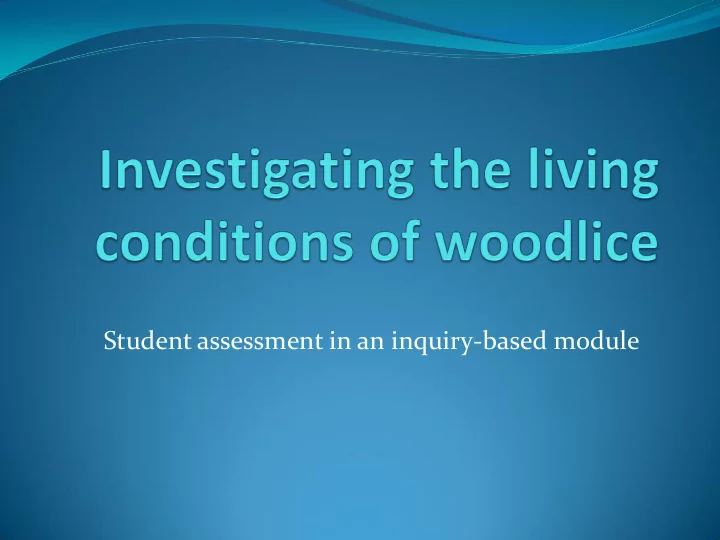

Student assessment in an inquiry-based module
Assessment of Inquiry How do we assess inquiry skills? Written evidence? Which inquiry skills? How many skills? During inquiry or at the end How much teacher time and effort? Summative or Formative Grades Feedback
Lesson 1 (single period) Open discussion in small groups Previous concepts/knowledge Asking testable questions Choosing a variable to investigate Drawing of experimental setup Equipment list Woodlice requirements!
Lesson 2 (Double session) Report booklets handed out Chamber construction, equipment distribution Cardboard boxes Trays Lamps Foodstuffs Wood (fresh, decomposed, timber, sticks etc) Cotton wool, paper towels, sand, soil etc... Experiments carried out Initial results gathered, analysed and presented
Lesson 3 (Double session) Re-formulating hypotheses Experimental re-design Replication Drawing conclusions Presenting data Written communication
Results!
Experimental design
The woodlice hotel
Difficult to replicate?
The cotton wool trap
Conclusion?
Developing a hypothesis
Communication
Confusion
Mixed-up variables
Some issues Dependent learners Many students wanted instructions “What do I do now?” Written evidence is not necessarily indicative “Filling - in” report booklets Data presentation Changes in experimental design and hypotheses Misunderstanding the nature of science “But what’s the actual answer...”
The problem of assessment It is necessary to assess while inquiry is underway. It is difficult to collect data on every student Assessing students initial attempts versus final outcomes Parroting, aping, copying Teacher dependence on summative grades
The need for grades!
Improvements Separate worksheets for each day Choose which aspects of inquiry you want to assess Analysing and interpreting data Re-formulating a hypothesis after testing Experimental design Whole group discussion session Sharing data and conclusions after initial experiments Clipboard assessment template Continuous in-class assessment of individuals/groups Students need feedback and practice regarding inquiry
Assessment of Inquiry Some key aspects of inquiry-based learning ( Harrison 2014) Students are engaged with a difficult problem or situation that is open-ended to such a degree that a variety of solutions or responses are conceivable. Students have control over the direction of the inquiry and the methods or approaches that are taken. Students draw upon their existing knowledge and they identify what their learning needs are. The different tasks stimulate curiosity in the students, which encourages them to continue to search for new data or evidence. The students are responsible for the analysis of the evidence and also for presenting evidence in an appropriate manner which defends their solution to the initial problem
Teachers on Assessment Harrison (2014) “The project teachers reported that they feel that they gain far more evidence of student performance by collecting evidence during the inquiry activities than from marking reports of the inquiry. They have realized that only a limited number of skills can be assessed if the evidence is only sourced from the written report....”
Formative assessment Harrison (2014): “ Through a formative approach, the teachers were able to find out which inquiry skills students can do well and which they had problems with. They were then able to use this assessment data to scaffold the next stage in learning for their students.”
Recommend
More recommend